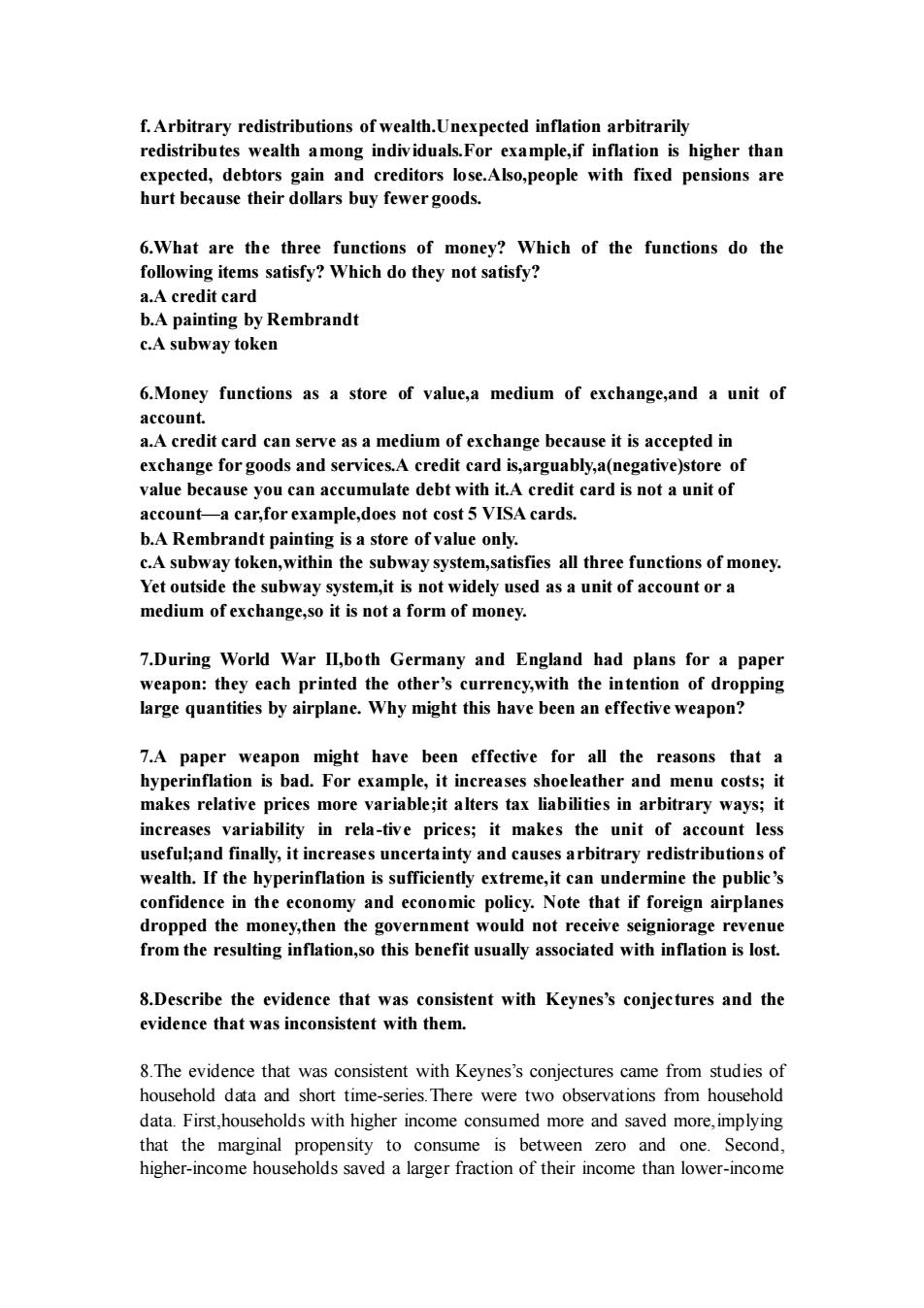正在加载图片...

redistr butes wealth among individuals.For example,if inflation is higher than expected,debtors gain and creditors lose.Also,people with fixed pensions are hurt because their dollars buy fewer goods. 6.What are the three functions of money?Which of the functions do the followin s satisfy?Which do they not satisfy? a.A credit card b.A painting by Rembrandt c.A subway token 6.Money functions as a store of value,a medium of exchange,and a unit of account a.A credit card can serve as a medium of exchange because it is accepted in exchange for goods and services.A credit card is,arguably,a(negative)store of value because you can accumulate debt with it.A credit card is not a unit of account-a car,for example,does not cost 5 VISA cards. b.A Rembrandt pair ng is a store of value only. c.A subway token,within the subway system,satisfies all three functions of money. Yet outside the subway system,it is not widely used as a unit of account or a medium of exchange,so it is not a form of money. 7.During World War II,bot Ge ermany and England had plan s for a pape weapon:they each printed the other's currency,with the intention of dropping large quantities by airplane.Why might this have been an effective weapon? 7.A paper weapon might have been effective for all the reasons that a nflation is bad.For ex ample. it in creas her and menu costs;it s more variable;it alters tax liabilities i trary ways it increases variability in rela-tive prices:it makes the unit of account less useful;and finally,it increases uncertainty and causes arbitrary redistributions of wealth.If the hyperinflation is sufficiently extreme,it can undermine the public's confidence in th economy and economic policy.Note that if foreign air lanes dropp ed the not re from the resulting inflation,so this benefit usually associated with inflation is lost 8.Describe the evidence that was consistent with Keynes's conjectures and the evidence that was inconsistent with them. 8.The evidence that was consistent with Keynes's conjectures came from studies of household data and short time-series.There were two observations from household data.First,households with higher income consumed more and saved more,implying that the marginal propensity to consume is between zero and one.Second. higher-income households saved a larger fraction of their income than lower-incomef.Arbitrary redistributions of wealth.Unexpected inflation arbitrarily redistributes wealth among individuals.For example,if inflation is higher than expected, debtors gain and creditors lose.Also,people with fixed pensions are hurt because their dollars buy fewer goods. 6.What are the three functions of money? Which of the functions do the following items satisfy? Which do they not satisfy? a.A credit card b.A painting by Rembrandt c.A subway token 6.Money functions as a store of value,a medium of exchange,and a unit of account. a.A credit card can serve as a medium of exchange because it is accepted in exchange for goods and services.A credit card is,arguably,a(negative)store of value because you can accumulate debt with it.A credit card is not a unit of account—a car,for example,does not cost 5 VISA cards. b.A Rembrandt painting is a store of value only. c.A subway token,within the subway system,satisfies all three functions of money. Yet outside the subway system,it is not widely used as a unit of account or a medium of exchange,so it is not a form of money. 7.During World War II,both Germany and England had plans for a paper weapon: they each printed the other’s currency,with the intention of dropping large quantities by airplane. Why might this have been an effective weapon? 7.A paper weapon might have been effective for all the reasons that a hyperinflation is bad. For example, it increases shoeleather and menu costs; it makes relative prices more variable;it alters tax liabilities in arbitrary ways; it increases variability in rela-tive prices; it makes the unit of account less useful;and finally, it increases uncertainty and causes arbitrary redistributions of wealth. If the hyperinflation is sufficiently extreme,it can undermine the public’s confidence in the economy and economic policy. Note that if foreign airplanes dropped the money,then the government would not receive seigniorage revenue from the resulting inflation,so this benefit usually associated with inflation is lost. 8.Describe the evidence that was consistent with Keynes’s conjectures and the evidence that was inconsistent with them. 8.The evidence that was consistent with Keynes’s conjectures came from studies of household data and short time-series.There were two observations from household data. First,households with higher income consumed more and saved more,implying that the marginal propensity to consume is between zero and one. Second, higher-income households saved a larger fraction of their income than lower-income